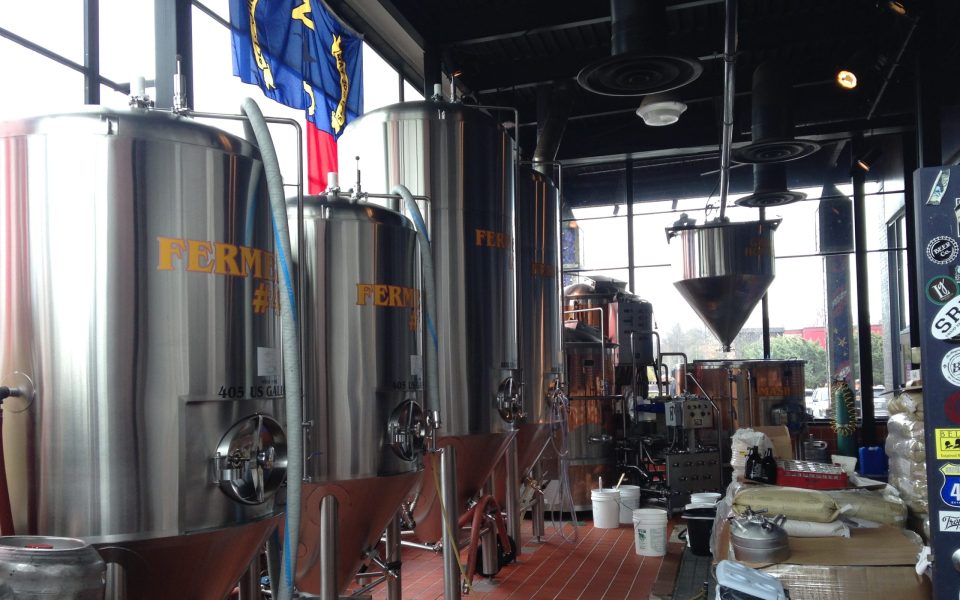State law mandates that breweries topping 25,000 barrels a year in production must use a distributor (also known as a wholesaler) to distribute their products to retailers. The law isn’t all that popular with smaller local breweries, and there’s a movement to change it.
Craft breweries can benefit from using distributors if the breweries don’t have infrastructure like refrigerated trucks to ship their wares to retailers, or if they don’t have time to form relationships with retailers.
Winston-Salem’s Foothills Brewing is one such business with a positive relationship with its distributor, United Beverages of North Carolina, as the ubiquity of Foothills beer in restaurants, bars, bottleshops and grocery stores indicates.
“We just didn’t have the accounts or the relationships to get into grocery channels and convenience store channels… before we started working with distributors,” Foothills President Jamie Bartholomaus says in a recent marketing video for NC Beer & Wine Wholesalers Association.
Distributors also laud the current system, claiming lower prices for consumers and less competition for new breweries that are just starting out.
But problems can arise if distributors care more about the profits from easy-to-sell Big Beer brands than lesser-known craft beer products, and some breweries don’t like the requirement forcing them to contract a middleman.
“A distributor rep could have a portfolio exceeding 100 beers,” said Todd Isbell, the brewer at Liberty Brewery & Grill in High Point. “The sales interactions between a craft brewery and a customer could invariably be enhanced with an intimate, one-on-one relationship, as opposed to using a third party.”
Self-distribution without production regulation is the goal of many North Carolina craft breweries. The so-called “craft freedom” movement — spearheaded by Red Oak and supported by nearby breweries like Pig Pounder in Greensboro and Four Saints in Asheboro — aims to put power back into breweries’ hands by pushing for legislative reform.
On Feb. 8, a bipartisan group of legislators including Guilford County Democrat Rep. Pricey Harrison introduced House Bill 67, which would increase the current cap to 100,000 barrels a year.
Liberty, a brewpub that sells its beers on premises, produces just 800 barrels a year. But Isbell, who brews without assistance, is against the production cap on principle.
“I have no problems with distributors,” Isbell said, “but I’m against [the law] from an American entrepreneur standpoint. Craft breweries should be able to choose whether or not to use a distributor.”
According to a March 6 press release from Democracy North Carolina, a left-leaning nonprofit based in Durham, individual beer distributors and the NC Beer & Wine Wholesalers PAC donated almost $1.5 million from 2013 to 2016 to key lawmakers, most of them Republicans.
Tim Kent, the executive director of the NC Beer & Wine Wholesalers Association, defended the expenditures to Triad City Beat.
“Our member companies and their owners have been actively engaged in the political process for several generations,” Kent said. “They will continue to do so now and in the future. We make no apologies for that.”
Guilford County Sen. Trudy Wade, a Republican, received $19,750 from distributors. Wade is the co-chair of the Senate Commerce Committee, which will likely vet HB 67 if it reaches the state Senate.
Wade, who is notoriously unresponsive to media inquiries, didn’t respond to requests for comment before press time.
A day after being introduced, the bill was referred to the Committee on Alcoholic Beverage Control, where it’s remained for more than a month. Rep. Jamie Boles, a Southern Pines Republican and a chairman of the committee, received almost $33,000 from distributors between 2013 and 2016, with $11,000 coming from the NC Beer & Wine Wholesalers PAC.
Guilford County Republican Rep. Jon Hardister, who has expressed opposition to restrictive state beer laws before, is a vice chairman on the committee and couldn’t be reached for comment.
For small brewers like Isbell, the law is counterintuitive and needs to be changed.
“I don’t understand the rationale behind the government saying, ‘You’re doing too great. Now, you have to sell to this person you don’t know,’” said Isbell. “If you can’t expand organically, you’re forced to lose out.”
Join the First Amendment Society, a membership that goes directly to funding TCB‘s newsroom.
We believe that reporting can save the world.
The TCB First Amendment Society recognizes the vital role of a free, unfettered press with a bundling of local experiences designed to build community, and unique engagements with our newsroom that will help you understand, and shape, local journalism’s critical role in uplifting the people in our cities.
All revenue goes directly into the newsroom as reporters’ salaries and freelance commissions.


Leave a Reply